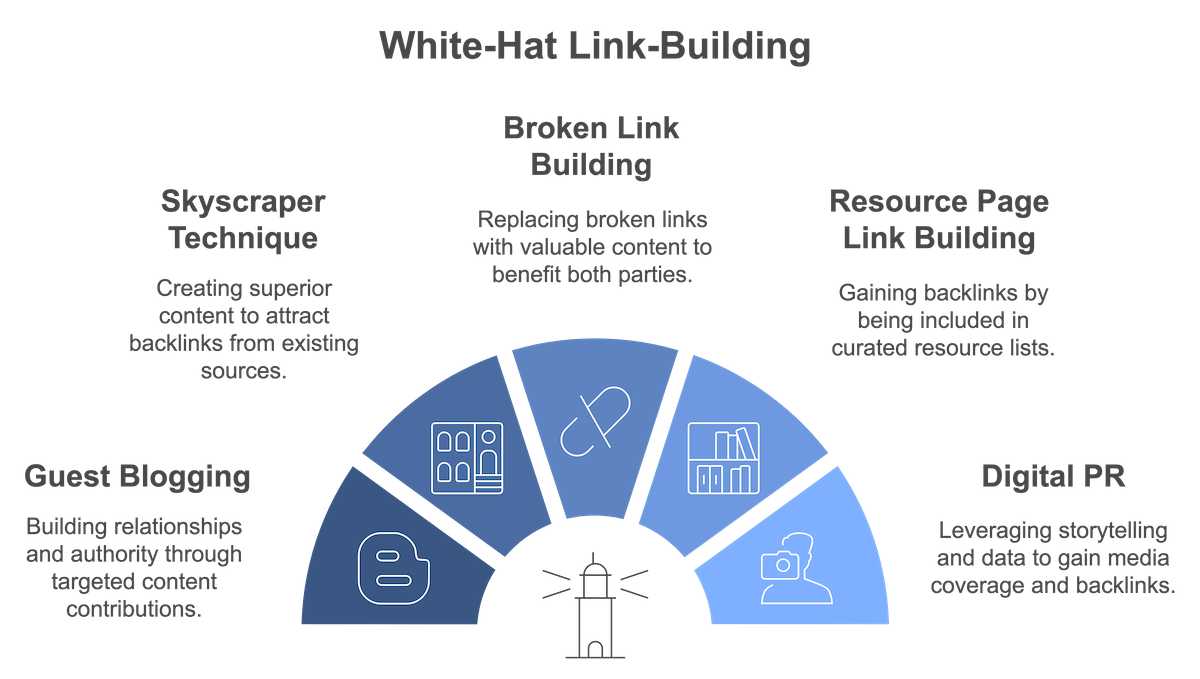10 White-Hat Link-Building Tactics That Still Work in 2024
By: Hayden Jarman

Backlinks are like votes for your website's credibility.
When high-quality websites link to you, it signals to search engines that your content is valuable. That's why white-hat link-building strategies are critical—they're ethical, effective, and future-proof.
Here are the most impactful white-hat tactics you can use in 2024 to grow your authority and rankings without risking penalties.
Table of Contents:
- Guest Blogging
- The Skyscraper Technique
- Broken Link Building
- Resource Page Link Building
- Digital PR
- HARO (Help a Reporter Out)
- Infographics
- Content Syndication
- Influencer Outreach
- Ethical Link Exchanges
- Final Thoughts
🎯 Which Link-Building Tactic Suits Your Strategy? 🔗
Answer the following questions to discover the best white-hat link-building tactic for your goals!
Guest Blogging
Guest blogging works because it builds relationships, boosts authority, and drives referral traffic.
The key is to target websites with high domain authority and audiences that align with your niche. Your pitch has to deliver real value, not a thinly veiled backlink grab.
Why it's still relevant:
- 75.33% of SEO experts use guest blogging to build links.
- 73.30% of blogs accept guest posts, making it a scalable strategy.
Pro Tip: Don't spam generic pitches. Research the site's audience, tone, and gaps in their content. Tailor every article idea to what they'll find useful.
Learn More: Explore our SEO Health Check guide.
The Skyscraper Technique
This tactic is about creating the best version of existing content.
If someone else's article is getting all the links, make something better, richer, and more relevant. Then, pitch it to the websites linking to the original.
How to execute:
- Find popular content in your niche using tools like Ahrefs or SEMrush.
- Add value with deeper research, better visuals, or updated stats.
- Reach out to the sites linking to the older content with your improved version.
Why it works:
- 18% of marketers report success with this technique.
- It naturally earns backlinks because people want to link to the best.
Pro Tip: Focus on evergreen topics. Trends die fast, but comprehensive resources stay relevant.
Broken Link Building
Broken link building is a win-win for everyone.
You help websites fix their broken links while earning yourself a backlink. It's simple, effective, and appreciated by site owners.
How to leverage this tactic:
- Use SEMrush or Ahrefs to find broken links on high-authority sites.
- Create content that fills the gap left by the broken link.
- Send a polite email offering your resource as a replacement.
Why it works:
- 48% of SEO professionals swear by this strategy.
- It improves the linking website's user experience while boosting your backlink profile.
Pro Tip: Always ensure your replacement content is better than what was there before.
Learn More: Check out our guide on SEO-friendly website development.
Resource Page Link Building
Resource pages are curated lists of tools, guides, and references that are goldmines for backlinks.
If your content offers genuine value, these pages will want to include your link.
Steps to get featured:
- Search for resource pages with queries like "best [topic] resources" or "inurl."
- Create content that fits seamlessly with their curated list.
- Reach out with a personalized pitch that highlights the value your content adds.
Why it's effective:
- 56% of SEO experts recommend this tactic.
- Resource pages are built to link out, making them a natural fit for your content.
Pro Tip: Aim for niche-specific resource pages for higher-quality backlinks.
Digital PR
Digital PR combines storytelling with strategic outreach.
Instead of focusing on old-school press releases, think viral campaigns, data reports, and attention-grabbing visuals.
How to stand out:
- Leverage unique insights or proprietary data.
- Use visuals like charts, infographics, or short videos to make your story pop.
- Build relationships with journalists and bloggers in your industry.
Why it works:
- 36% of SEO professionals rely on digital PR for backlinks.
- Media coverage often results in backlinks from multiple high-authority sites.
Pro Tip: Create content that's easy to share and repurpose.
HARO (Help a Reporter Out)
Journalists need expert quotes, and HARO connects them with you.
By responding to HARO queries, you can get featured in top-tier publications and earn backlinks from trusted sources.
How it works:
- Sign up for HARO alerts.
- Respond to relevant queries with concise, value-packed answers.
Why it's worth your time:
- 42% of marketers use HARO for backlinks.
- It builds your authority while generating high-quality links.
Pro Tip: Focus on speed and clarity. Journalists often work on tight deadlines.
Infographics
Infographics simplify complex information into shareable visuals. They naturally attract links because people love sharing them.
How to use infographics effectively:
- Focus on data-driven content that solves a specific problem.
- Share them across social platforms and infographic directories like Visual.ly or Infographic Journal.
Why it's a smart play:
- Infographics can increase web traffic by up to 12%.
- They're versatile and work well for outreach campaigns.
Pro Tip: Pair your infographic with an in-depth blog post to maximize its impact.
Learn More: Read about ranking a website with multiple locations.
Content Syndication
Content syndication expands your reach by republishing your work on other platforms. It's a great way to drive traffic and earn backlinks.
Where to syndicate:
- Medium
- LinkedIn Articles
- Industry-specific sites with high authority.
Why it works:
- 65% of marketers use content syndication to gain visibility.
- It introduces your content to new audiences while building links.
Pro Tip: Include canonical tags when syndicating to avoid duplicate content penalties.
Influencer Outreach
Influencers can amplify your content and connect you with their audience. This can lead to valuable backlinks, especially when promoting niche-specific resources.
Steps to success:
- Identify influencers in your industry with an engaged audience.
- Build genuine relationships before making an ask.
- Offer something valuable in return, like exclusive content or early access.
Why it's effective:
- Influencer collaborations are authentic and audience-driven.
- They often result in multiple backlinks and increased social shares.
Ethical Link Exchanges
Unlike spammy link swapping, ethical link exchanges focus on creating value for both parties. When done right, it strengthens relationships and boosts SEO.
How to approach it:
- Partner with websites that complement your content.
- Ensure the exchange benefits both audiences.
Why it's still relevant:
- 38.67% of SEO professionals find link exchanges effective.
- It's a straightforward way to grow your backlink profile.
Pro Tip: Be transparent about the exchange to avoid any SEO penalties.

Final Thoughts
White-hat link-building isn't about quick wins or shortcuts. It's about creating value and building relationships.
By using these 10 tactics, you'll not only improve your rankings but also strengthen your brand's credibility. Start small, focus on quality, and watch the results compound over time.
Related Posts:
- Understanding Google’s Local Pack: How to Get Featured
- Google Business Profile FAQs: Everything You Need to Know
- The Best Google Ads Extensions to Boost Your Click-Through Rates
- How to Leverage Facebook Groups for Local Business Leads
- How to Use AI to Write Better Social Media Captions
- How to Optimize Google Reviews to Attract More Customers
- LinkedIn for B2B Marketing Success
- How to Conduct a Social Media Audit (w/ "Audit Readiness" Quiz!)
- Creating a Content Calendar for Consistent Posting
- The Importance of Mobile Optimization in 2024
- Data Privacy Regulations: What Marketers Need to Know
- The Role of Chatbots in Enhancing Customer Service
- SEO for Small Business: The Ultimate Guide to Getting Found Online
- The Role of Keyword Clustering in Modern SEO

